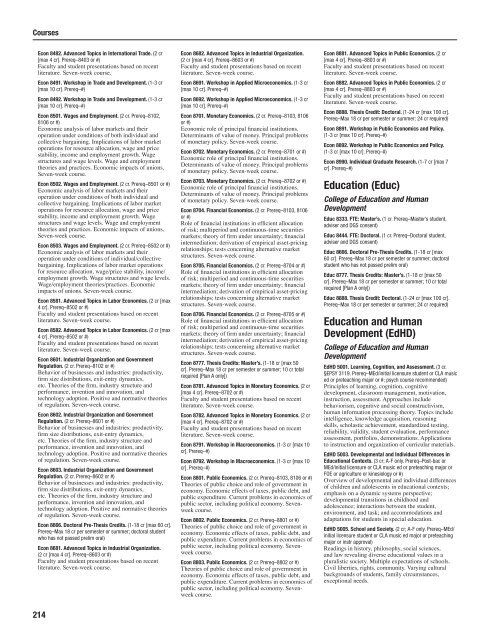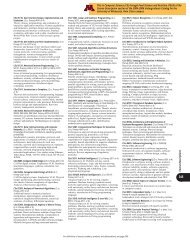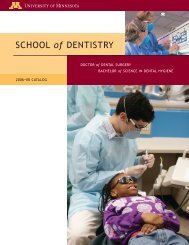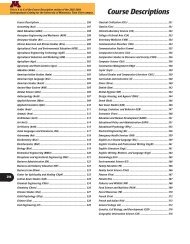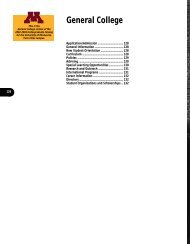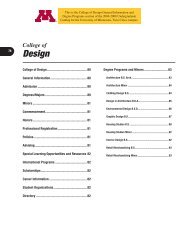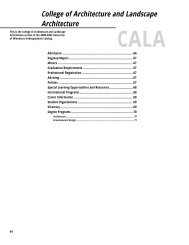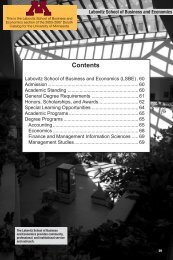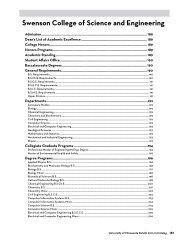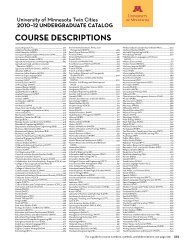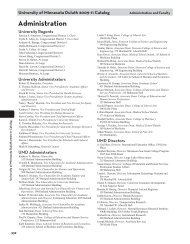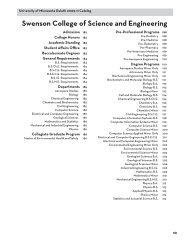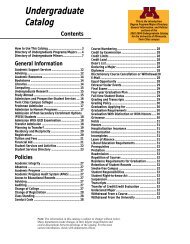Accounting through Education and Human Development - University ...
Accounting through Education and Human Development - University ...
Accounting through Education and Human Development - University ...
Create successful ePaper yourself
Turn your PDF publications into a flip-book with our unique Google optimized e-Paper software.
Courses<br />
Econ 8482. Advanced Topics in International Trade. (2 cr<br />
[max 4 cr]. Prereq–8403 or #)<br />
Faculty <strong>and</strong> student presentations based on recent<br />
literature. Seven-week course.<br />
Econ 8491. Workshop in Trade <strong>and</strong> <strong>Development</strong>. (1-3 cr<br />
[max 10 cr]. Prereq–#)<br />
Econ 8492. Workshop in Trade <strong>and</strong> <strong>Development</strong>. (1-3 cr<br />
[max 10 cr]. Prereq–#)<br />
Econ 8501. Wages <strong>and</strong> Employment. (2 cr. Prereq–8102,<br />
8106 or #)<br />
Economic analysis of labor markets <strong>and</strong> their<br />
operation under conditions of both individual <strong>and</strong><br />
collective bargaining. Implications of labor market<br />
operations for resource allocation, wage <strong>and</strong> price<br />
stability, income <strong>and</strong> employment growth. Wage<br />
structures <strong>and</strong> wage levels. Wage <strong>and</strong> employment<br />
theories <strong>and</strong> practices. Economic impacts of unions.<br />
Seven-week course.<br />
Econ 8502. Wages <strong>and</strong> Employment. (2 cr. Prereq–8501 or #)<br />
Economic analysis of labor markets <strong>and</strong> their<br />
operation under conditions of both individual <strong>and</strong><br />
collective bargaining. Implications of labor market<br />
operations for resource allocation, wage <strong>and</strong> price<br />
stability, income <strong>and</strong> employment growth. Wage<br />
structures <strong>and</strong> wage levels. Wage <strong>and</strong> employment<br />
theories <strong>and</strong> practices. Economic impacts of unions.<br />
Seven-week course.<br />
Econ 8503. Wages <strong>and</strong> Employment. (2 cr. Prereq–8502 or #)<br />
Economic analysis of labor markets <strong>and</strong> their<br />
operation under conditions of individual/collective<br />
bargaining. Implications of labor market operations<br />
for resource allocation, wage/price stability, income/<br />
employment growth. Wage structures <strong>and</strong> wage levels.<br />
Wage/employment theories/practices. Economic<br />
impacts of unions. Seven-week course.<br />
Econ 8581. Advanced Topics in Labor Economics. (2 cr [max<br />
4 cr]. Prereq–8502 or #)<br />
Faculty <strong>and</strong> student presentations based on recent<br />
literature. Seven-week course.<br />
Econ 8582. Advanced Topics in Labor Economics. (2 cr [max<br />
4 cr]. Prereq–8502 or #)<br />
Faculty <strong>and</strong> student presentations based on recent<br />
literature. Seven-week course.<br />
Econ 8601. Industrial Organization <strong>and</strong> Government<br />
Regulation. (2 cr. Prereq–8102 or #)<br />
Behavior of businesses <strong>and</strong> industries: productivity,<br />
firm size distributions, exit-entry dynamics,<br />
etc. Theories of the firm, industry structure <strong>and</strong><br />
performance, invention <strong>and</strong> innovation, <strong>and</strong><br />
technology adoption. Positive <strong>and</strong> normative theories<br />
of regulation. Seven-week course.<br />
Econ 8602. Industrial Organization <strong>and</strong> Government<br />
Regulation. (2 cr. Prereq–8601 or #)<br />
Behavior of businesses <strong>and</strong> industries: productivity,<br />
firm size distributions, exit-entry dynamics,<br />
etc. Theories of the firm, industry structure <strong>and</strong><br />
performance, invention <strong>and</strong> innovation, <strong>and</strong><br />
technology adoption. Positive <strong>and</strong> normative theories<br />
of regulation. Seven-week course.<br />
Econ 8603. Industrial Organization <strong>and</strong> Government<br />
Regulation. (2 cr. Prereq–8602 or #)<br />
Behavior of businesses <strong>and</strong> industries: productivity,<br />
firm size distributions, exit-entry dynamics,<br />
etc. Theories of the firm, industry structure <strong>and</strong><br />
performance, invention <strong>and</strong> innovation, <strong>and</strong><br />
technology adoption. Positive <strong>and</strong> normative theories<br />
of regulation. Seven-week course.<br />
Econ 8666. Doctoral Pre-Thesis Credits. (1-18 cr [max 60 cr].<br />
Prereq–Max 18 cr per semester or summer; doctoral student<br />
who has not passed prelim oral)<br />
Econ 8681. Advanced Topics in Industrial Organization.<br />
(2 cr [max 4 cr]. Prereq–8603 or #)<br />
Faculty <strong>and</strong> student presentations based on recent<br />
literature. Seven-week course.<br />
Econ 8682. Advanced Topics in Industrial Organization.<br />
(2 cr [max 4 cr]. Prereq–8603 or #)<br />
Faculty <strong>and</strong> student presentations based on recent<br />
literature. Seven-week course.<br />
Econ 8691. Workshop in Applied Microeconomics. (1-3 cr<br />
[max 10 cr]. Prereq–#)<br />
Econ 8692. Workshop in Applied Microeconomics. (1-3 cr<br />
[max 10 cr]. Prereq–#)<br />
Econ 8701. Monetary Economics. (2 cr. Prereq–8103, 8106<br />
or #)<br />
Economic role of principal financial institutions.<br />
Determinants of value of money. Principal problems<br />
of monetary policy. Seven-week course.<br />
Econ 8702. Monetary Economics. (2 cr. Prereq–8701 or #)<br />
Economic role of principal financial institutions.<br />
Determinants of value of money. Principal problems<br />
of monetary policy. Seven-week course.<br />
Econ 8703. Monetary Economics. (2 cr. Prereq–8702 or #)<br />
Economic role of principal financial institutions.<br />
Determinants of value of money. Principal problems<br />
of monetary policy. Seven-week course.<br />
Econ 8704. Financial Economics. (2 cr. Prereq–8103, 8106<br />
or #)<br />
Role of financial institutions in efficient allocation<br />
of risk; multiperiod <strong>and</strong> continuous-time securities<br />
markets; theory of firm under uncertainty; financial<br />
intermediation; derivation of empirical asset-pricing<br />
relationships; tests concerning alternative market<br />
structures. Seven-week course.<br />
Econ 8705. Financial Economics. (2 cr. Prereq–8704 or #)<br />
Role of financial institutions in efficient allocation<br />
of risk; multiperiod <strong>and</strong> continuous-time securities<br />
markets; theory of firm under uncertainty; financial<br />
intermediation; derivation of empirical asset-pricing<br />
relationships; tests concerning alternative market<br />
structures. Seven-week course.<br />
Econ 8706. Financial Economics. (2 cr. Prereq–8705 or #)<br />
Role of financial institutions in efficient allocation<br />
of risk; multiperiod <strong>and</strong> continuous-time securities<br />
markets; theory of firm under uncertainty; financial<br />
intermediation; derivation of empirical asset-pricing<br />
relationships; tests concerning alternative market<br />
structures. Seven-week course.<br />
Econ 8777. Thesis Credits: Master’s. (1-18 cr [max 50<br />
cr]. Prereq–Max 18 cr per semester or summer; 10 cr total<br />
required [Plan A only])<br />
Econ 8781. Advanced Topics in Monetary Economics. (2 cr<br />
[max 4 cr]. Prereq–8702 or #)<br />
Faculty <strong>and</strong> student presentations based on recent<br />
literature. Seven-week course.<br />
Econ 8782. Advanced Topics in Monetary Economics. (2 cr<br />
[max 4 cr]. Prereq–8702 or #)<br />
Faculty <strong>and</strong> student presentations based on recent<br />
literature. Seven-week course.<br />
Econ 8791. Workshop in Macroeconomics. (1-3 cr [max 10<br />
cr]. Prereq–#)<br />
Econ 8792. Workshop in Macroeconomics. (1-3 cr [max 10<br />
cr]. Prereq–#)<br />
Econ 8801. Public Economics. (2 cr. Prereq–8103, 8106 or #)<br />
Theories of public choice <strong>and</strong> role of government in<br />
economy. Economic effects of taxes, public debt, <strong>and</strong><br />
public expenditure. Current problems in economics of<br />
public sector, including political economy. Sevenweek<br />
course.<br />
Econ 8802. Public Economics. (2 cr. Prereq–8801 or #)<br />
Theories of public choice <strong>and</strong> role of government in<br />
economy. Economic effects of taxes, public debt, <strong>and</strong><br />
public expenditure. Current problems in economics of<br />
public sector, including political economy. Sevenweek<br />
course.<br />
Econ 8803. Public Economics. (2 cr. Prereq–8802 or #)<br />
Theories of public choice <strong>and</strong> role of government in<br />
economy. Economic effects of taxes, public debt, <strong>and</strong><br />
public expenditure. Current problems in economics of<br />
public sector, including political economy. Sevenweek<br />
course.<br />
Econ 8881. Advanced Topics in Public Economics. (2 cr<br />
[max 4 cr]. Prereq–8803 or #)<br />
Faculty <strong>and</strong> student presentations based on recent<br />
literature. Seven-week course.<br />
Econ 8882. Advanced Topics in Public Economics. (2 cr<br />
[max 4 cr]. Prereq–8803 or #)<br />
Faculty <strong>and</strong> student presentations based on recent<br />
literature. Seven-week course.<br />
Econ 8888. Thesis Credit: Doctoral. (1-24 cr [max 100 cr].<br />
Prereq–Max 18 cr per semester or summer; 24 cr required)<br />
Econ 8891. Workshop in Public Economics <strong>and</strong> Policy.<br />
(1-3 cr [max 10 cr]. Prereq–#)<br />
Econ 8892. Workshop in Public Economics <strong>and</strong> Policy.<br />
(1-3 cr [max 10 cr]. Prereq–#)<br />
Econ 8990. Individual Graduate Research. (1-7 cr [max 7<br />
cr]. Prereq–#)<br />
<strong>Education</strong> (Educ)<br />
College of <strong>Education</strong> <strong>and</strong> <strong>Human</strong><br />
<strong>Development</strong><br />
Educ 8333. FTE: Master’s. (1 cr. Prereq–Master’s student,<br />
adviser <strong>and</strong> DGS consent)<br />
Educ 8444. FTE: Doctoral. (1 cr. Prereq–Doctoral student,<br />
adviser <strong>and</strong> DGS consent)<br />
Educ 8666. Doctoral Pre-Thesis Credits. (1-18 cr [max<br />
60 cr]. Prereq–Max 18 cr per semester or summer; doctoral<br />
student who has not passed prelim oral)<br />
Educ 8777. Thesis Credits: Master’s. (1-18 cr [max 50<br />
cr]. Prereq–Max 18 cr per semester or summer; 10 cr total<br />
required [Plan A only])<br />
Educ 8888. Thesis Credit: Doctoral. (1-24 cr [max 100 cr].<br />
Prereq–Max 18 cr per semester or summer; 24 cr required)<br />
<strong>Education</strong> <strong>and</strong> <strong>Human</strong><br />
<strong>Development</strong> (EdHD)<br />
College of <strong>Education</strong> <strong>and</strong> <strong>Human</strong><br />
<strong>Development</strong><br />
EdHD 5001. Learning, Cognition, <strong>and</strong> Assessment. (3 cr.<br />
§EPSY 3119. Prereq–MEd/initial licensure student or CLA music<br />
ed or preteaching major or #; psych course recommended)<br />
Principles of learning, cognition, cognitive<br />
development, classroom management, motivation,<br />
instruction, assessment. Approaches include<br />
behaviorism, cognitive <strong>and</strong> social constructivism,<br />
human information processing theory. Topics include<br />
intelligence, knowledge acquisition, reasoning<br />
skills, scholastic achievement, st<strong>and</strong>ardized testing,<br />
reliability, validity, student evaluation, performance<br />
assessment, portfolios, demonstrations. Applications<br />
to instruction <strong>and</strong> organization of curricular materials.<br />
EdHD 5003. <strong>Development</strong>al <strong>and</strong> Individual Differences in<br />
<strong>Education</strong>al Contexts. (3 cr; A-F only. Prereq–Post-bac or<br />
MEd/initial licensure or CLA music ed or preteaching major or<br />
FOE or agriculture or kinesiology or #)<br />
Overview of developmental <strong>and</strong> individual differences<br />
of children <strong>and</strong> adolescents in educational contexts;<br />
emphasis on a dynamic systems perspective;<br />
developmental transitions in childhood <strong>and</strong><br />
adolescence; interactions between the student,<br />
environment, <strong>and</strong> task; <strong>and</strong> accommodations <strong>and</strong><br />
adaptations for students in special education.<br />
EdHD 5005. School <strong>and</strong> Society. (2 cr; A-F only. Prereq–MEd/<br />
initial licensure student or CLA music ed major or preteaching<br />
major or instr approval)<br />
Readings in history, philosophy, social sciences,<br />
<strong>and</strong> law revealing diverse educational values in a<br />
pluralistic society. Multiple expectations of schools.<br />
Civil liberties, rights, community. Varying cultural<br />
backgrounds of students, family circumstances,<br />
exceptional needs.<br />
214


